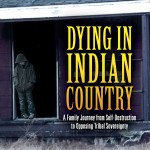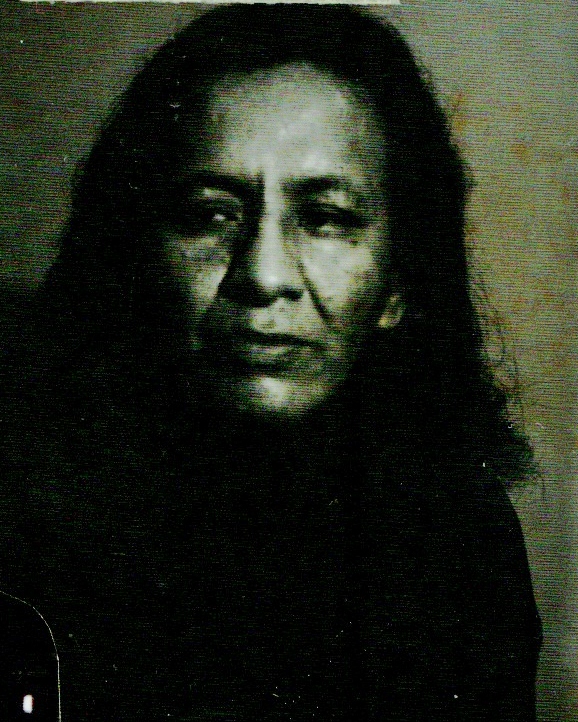Book: Dying in Indian Country

.
Raised on a reservation speaking Ojibwe as a first language, a father works to protect his children from a corrupt tribal government system.
http:DyinginIndianCountry.com
.
Chapter one: May, 1980
It had just turned daylight when we pulled the yellow Chevy station wagon into the small town of Cass Lake. The morning was dawning warm and sunny. Roland was driving. I had been sleeping in the front seat next to him, and his nephew Matthew and Matthew’s girlfriend were sleeping in the back seat. Roland drove through the treeless streets of the tribal tract housing and pulled into the dirt driveway of a yellow house. It was early, but the sun was already beating down. It was going to be a hot day.

Roland honked his horn. Out of a rundown shed from back behind the house, a heavy woman with long black hair emerged unsteadily and stood in its doorway. Roland called her over to the car. Coughing, Annie unsteadily crossed the grass and came up next to the driver’s side. The smell of alcohol wafted through the window.
They greeted each other and Roland asked where the wake was being held.
“Up to Bug school,” she said, and then bent her head to throw up on the ground.
Roland averted his eyes and patiently waited.
Lifting her head, Annie and Roland spoke briefly again before he said good-bye and pulled the car back out of the driveway.
The wake was in a small building at Bug-a-ne-ge-shig school in a shady, wooded area known as “Mission.” I felt very uncomfortable as we pulled up. It was easy to ride in a car going somewhere, but now we were here. I was now far away from home and knew no one but Roland. Numbly, I climbed out of the car. I had never been around many Indian people before. How should I act?
As we entered the dark building I stayed close to Roland. A quick glance around the room showed me I was the only white person there. Many people milled about talking to each other in the main room. Feeling out of place, I avoided looking at anyone and said nothing. Roland moved through the crowd to the kitchen. Hands sweating, I stiffly followed. The women in the kitchen were busy preparing food for the feed that would follow the service. Roland greeted his sister and introduced me.
“Elaine, this is Beth.”
Elaine looked up from her work and said hello. She and Roland spoke for a moment, Roland motioned to me, and I tensely shadowed him back into the main room.
He led me through the crowd toward a miniature casket placed alone by the wall. I actually felt some relief as I trailed him. Standing at the casket would be easier than standing apart in the crowd. Roland took a moment at the casket and then stepped aside for me to see. Looking down I saw a precious sleeping child, a small, dark haired girl in a pretty little dress, no more than two years old. Lying peacefully, if you ignored her bruised and battered face.
Roland had told me earlier that his niece had died from a fall from the couch onto a cement floor, but as I looked down at the bruises on both sides of her face, I wondered if that was true.
Turning from the casket, Roland moved toward a tall, slim young man. James, he told me, was his nephew and the father of the little girl. For a short time they whispered together. Roland then turned to me, “Wait here while I go outside to talk to James alone.” But afraid to stay inside surrounded by strangers, I followed them out and sat on the stoop, nervously watching and waiting as Roland and James walked down the dirt driveway and then out onto the dusty road. My eyes followed Roland as long as he was still visible through the trees. As he disappeared, two men emerged from inside and stood a short distance away as they shared a cigarette. How does one sit, what does one look at, what does one do with their hands when one is isolated, alone and out of place? It seemed an eternity before Roland returned, although I knew it was just a short time.
The tiny cemetery was in a heavily forested area near a lake. We followed other cars down a long, narrow, muddy road to get there. Circling through the cemetery, there was nowhere to park. The small area was packed with cars and people. We drove back down the road a ways until we found a spot and then walked back up to the crowd.
At the edge of the crowd, we stood some distance from the ceremony. The graveside service was brief. As it ended and the first shovel of dirt was thrown into the small hole, the baby’s mother, Gloria, let out a loud wail and hung on to James, sobbing.
Roland nudged and we began walking back to the car. As I stepped over yesterday’s puddles, I glanced back at the slowly dispersing crowd.
What happened to that baby girl? I wondered, why won’t Roland tell me what happened?
The Need for this Book:
Roland grew up watching members of his family die of alcoholism, child abuse, suicide and violence on the reservation.
Drugs, alcohol and gang activity are heavy and rampant on many reservations. There are children dying within Indian Country whose names don’t make it to the media and for whom justice is never given.
“[A]lmost 40 children [have been] returned to on-reservation placements in abusive homes, many headed by known sex offenders, at the direction of the Tribal Chair. These children remain in the full time care and custody of sexual predators available to be raped on a daily basis. Since I filed my first report noting this situation, nothing has been done by any of you to remove these children to safe placements,” Thomas Sullivan, Regional Admin of the Administration of Children and Families in Denver, wrote in a report to his DC superiors in February, 2013.
A year later, Mr. Sullivan, stated nothing has changed, despite political posturing by numerous federal and tribal officials.
What cannot be denied is that a large number of tribal members are dying from alcoholism, drug abuse, suicide, and violence. While leaders argue why this is happening, the facts are, according to the American Indian Health Council, “crime victimization rates in the American Indian community are significantly higher than in the general U.S. population.”
Abuses are rampant on many reservations because the U.S. Government has set up a system that allows extensive abuse to occur unchecked and without repercussion.
Painting by author, 1988
.
Dying in Indian Country explains through this family’s well documented story, how Congress, federal agencies, welfare benefits, and the current reservation system itself are all responsible for the destruction of Native American families.
Though this book tells the reality and politics of family life on the reservation, the greater story is the spiritual transformation that takes place in the heart of Roland Morris. The reader experiences the journey of change in Roland as it slowly takes place. More than the trauma and politics within this book, this is also a true story about a transformed life.
The first section shares the family’s anguish as they sink into alcoholism and drug abuse. The second describes a transformational event in the father’s life which not only brings him to lead his family out of despair, but results in the family refusing welfare entitlements and fighting against tribal corruption and sovereignty.
Comments About Dying in Indian Country
“…a compassionate & honest portrayal…I highly recommend it to you!” Reed Elley, former MP, Canada; Chief Critic Indian Affairs, Pastor
“…hope emerging from despair… This is a story about an amazing life journey.” Darrel Smith. Writer, Rancher, SD
Dr. Allen, who also wrote a forward for the book, stated that Dying in Indian Country is –
“…truly gripping, with a good pace.” Dr. William B. Allen, Emeritus Professor, Political Science, MSU, & former Chair U.S. Commission on Civil Rights

God Bless Roland and Lisa Morris for sticking their neck on the chopping block to lift the dark cover of secrecy about abuse of children on the reservations. A friend loaned me the book Dying in Indian Country. I can relate to some of the story as I grew up just off the Ft, Belknap Reservation in central Montana. I am contacting Jon Arneson of the talk radio show in Billings..”Voices of Montana” to suggest that he have Roland and Lisa Morris on the show to talk about their story…My name is Helen Berger and I live in Lewistown, Montana. Feel free to contact me if you want to talk. I would like to continue to get your word out by writing to Letters to the Editor, etc. I have family on the Ft. Belknap Rez and I know personally about issues of rape, incest, and child abuse not addressed because of who’s who on the Tribal Court among other things.
Bless you!! We’ll let Lisa know! Thank you for being willing to speak out!